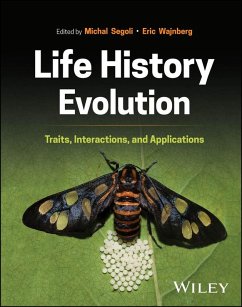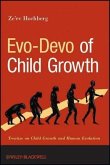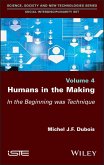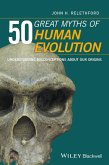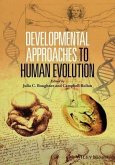Life History Evolution (eBook, PDF)
Traits, Interactions, and Applications
Redaktion: Segoli, Michal; Wajnberg, Eric
86,99 €
86,99 €
inkl. MwSt.
Sofort per Download lieferbar

0 °P sammeln
86,99 €
Als Download kaufen

86,99 €
inkl. MwSt.
Sofort per Download lieferbar

0 °P sammeln
Jetzt verschenken
Alle Infos zum eBook verschenken
86,99 €
inkl. MwSt.
Sofort per Download lieferbar
Alle Infos zum eBook verschenken

0 °P sammeln
Life History Evolution (eBook, PDF)
Traits, Interactions, and Applications
Redaktion: Segoli, Michal; Wajnberg, Eric
- Format: PDF
- Merkliste
- Auf die Merkliste
- Bewerten Bewerten
- Teilen
- Produkt teilen
- Produkterinnerung
- Produkterinnerung

Bitte loggen Sie sich zunächst in Ihr Kundenkonto ein oder registrieren Sie sich bei
bücher.de, um das eBook-Abo tolino select nutzen zu können.
Hier können Sie sich einloggen
Hier können Sie sich einloggen
Sie sind bereits eingeloggt. Klicken Sie auf 2. tolino select Abo, um fortzufahren.

Bitte loggen Sie sich zunächst in Ihr Kundenkonto ein oder registrieren Sie sich bei bücher.de, um das eBook-Abo tolino select nutzen zu können.
Provides a timely and authoritative account of Life History Evolution by a multidisciplinary team of scholars and researchers from around the world
Life History Evolution: Traits, Interactions, and Applications presents a cutting-edge synthesis of the mechanisms driving life history strategies that span the breadth of taxa, from bacteria to humans. Integrating classical and contemporary perspectives, this comprehensive volume addresses how organisms evolve traits in response to diverse ecological pressures. Editors Michal Segoli and Eric Wajnberg bring together leading experts to explore…mehr
- Geräte: PC
- mit Kopierschutz
- eBook Hilfe
- Größe: 28.77MB
Andere Kunden interessierten sich auch für
![Evo-Devo of Child Growth (eBook, PDF) Evo-Devo of Child Growth (eBook, PDF)]() Ze'ev HochbergEvo-Devo of Child Growth (eBook, PDF)144,99 €
Ze'ev HochbergEvo-Devo of Child Growth (eBook, PDF)144,99 €![Humans in the Making (eBook, PDF) Humans in the Making (eBook, PDF)]() Michel J. F. DuboisHumans in the Making (eBook, PDF)139,99 €
Michel J. F. DuboisHumans in the Making (eBook, PDF)139,99 €![Avian Evolution (eBook, PDF) Avian Evolution (eBook, PDF)]() Gerald MayrAvian Evolution (eBook, PDF)77,99 €
Gerald MayrAvian Evolution (eBook, PDF)77,99 €![Wiley-Blackwell Encyclopedia of Human Evolution (eBook, PDF) Wiley-Blackwell Encyclopedia of Human Evolution (eBook, PDF)]() Wiley-Blackwell Encyclopedia of Human Evolution (eBook, PDF)100,99 €
Wiley-Blackwell Encyclopedia of Human Evolution (eBook, PDF)100,99 €![The Evolution of Plant Physiology (eBook, PDF) The Evolution of Plant Physiology (eBook, PDF)]() The Evolution of Plant Physiology (eBook, PDF)91,95 €
The Evolution of Plant Physiology (eBook, PDF)91,95 €![50 Great Myths of Human Evolution (eBook, PDF) 50 Great Myths of Human Evolution (eBook, PDF)]() John H. Relethford50 Great Myths of Human Evolution (eBook, PDF)17,99 €
John H. Relethford50 Great Myths of Human Evolution (eBook, PDF)17,99 €![Developmental Approaches to Human Evolution (eBook, PDF) Developmental Approaches to Human Evolution (eBook, PDF)]() Developmental Approaches to Human Evolution (eBook, PDF)114,99 €
Developmental Approaches to Human Evolution (eBook, PDF)114,99 €-
-
-
Provides a timely and authoritative account of Life History Evolution by a multidisciplinary team of scholars and researchers from around the world
Life History Evolution: Traits, Interactions, and Applications presents a cutting-edge synthesis of the mechanisms driving life history strategies that span the breadth of taxa, from bacteria to humans. Integrating classical and contemporary perspectives, this comprehensive volume addresses how organisms evolve traits in response to diverse ecological pressures. Editors Michal Segoli and Eric Wajnberg bring together leading experts to explore the intersection of evolutionary biology, ecology, and applied research, focusing on the evolving complexity of life history traits and their implications.
In-depth yet accessible chapters cover a broad spectrum of life history traits, from classical traits of lifespan and reproduction to more complex interactions like social behaviour, predator-prey dynamics, and human-induced evolutionary processes. The contributing authors explain essential concepts, identify critical knowledge gaps, discuss future research directions, and demonstrate the relevance of life history evolution in addressing climate change, species invasion, pollution, and more.
Providing a well-balanced understanding of life history traits and their implications, Life History Evolution:
Revealing how life history traits shape the evolutionary strategies of organisms, Life History Evolution: Traits, Interactions, and Applications is an essential resource for undergraduate and graduate students, researchers, industry professionals, and policymakers in ecological science. It is an ideal textbook for courses in evolutionary ecology, evolutionary biology, conservation biology, environmental science, and environmental management.
Life History Evolution: Traits, Interactions, and Applications presents a cutting-edge synthesis of the mechanisms driving life history strategies that span the breadth of taxa, from bacteria to humans. Integrating classical and contemporary perspectives, this comprehensive volume addresses how organisms evolve traits in response to diverse ecological pressures. Editors Michal Segoli and Eric Wajnberg bring together leading experts to explore the intersection of evolutionary biology, ecology, and applied research, focusing on the evolving complexity of life history traits and their implications.
In-depth yet accessible chapters cover a broad spectrum of life history traits, from classical traits of lifespan and reproduction to more complex interactions like social behaviour, predator-prey dynamics, and human-induced evolutionary processes. The contributing authors explain essential concepts, identify critical knowledge gaps, discuss future research directions, and demonstrate the relevance of life history evolution in addressing climate change, species invasion, pollution, and more.
Providing a well-balanced understanding of life history traits and their implications, Life History Evolution:
- Incorporates recent advances in evolutionary theory, including eco-evolutionary feedback loops and anthropogenic impacts
- Offers diverse perspectives and original research from leading experts in fields such as evolutionary biology, ecology, entomology, zoology, agriculture, and veterinary medicine
- Discusses life history evolution in the context of co-evolved interactions such as predator-prey, parasite-host, plant-herbivore, and endosymbiont-host relationships
- Provides an overview of the foundational theory, recent developments, and current thinking in the field
- Features numerous case studies that highlight real-world applications in biological control, wildlife management, climate change adaptation, and others
Revealing how life history traits shape the evolutionary strategies of organisms, Life History Evolution: Traits, Interactions, and Applications is an essential resource for undergraduate and graduate students, researchers, industry professionals, and policymakers in ecological science. It is an ideal textbook for courses in evolutionary ecology, evolutionary biology, conservation biology, environmental science, and environmental management.
Dieser Download kann aus rechtlichen Gründen nur mit Rechnungsadresse in D ausgeliefert werden.
Produktdetails
- Produktdetails
- Verlag: John Wiley & Sons
- Seitenzahl: 499
- Erscheinungstermin: 18. Dezember 2024
- Englisch
- ISBN-13: 9781394185733
- Artikelnr.: 72643512
- Verlag: John Wiley & Sons
- Seitenzahl: 499
- Erscheinungstermin: 18. Dezember 2024
- Englisch
- ISBN-13: 9781394185733
- Artikelnr.: 72643512
- Herstellerkennzeichnung Die Herstellerinformationen sind derzeit nicht verfügbar.
Michal Segoli is an evolutionary and behavioural ecologist at Ben-Gurion University of the Negev, Israel, where she teaches courses in life history evolution, evolutionary ecology, and conservation biological control. Eric Wajnberg is a population biologist affiliated with INRIA and INRAE in France and USP/ESALQ in Brazil. With 40 years of experience, he focuses on population genetics, behavioural ecology, and statistical modeling.
List of Contributors xv
Foreword xix
Preface xxiii
Part I Traits 1
1 Body Size and Timing of Maturation 3
Toomas Tammaru and Tiit Teder
1.1 Introduction 3
1.2 Part I 3
1.3 Part II 13
1.4 Conclusions 18
Acknowledgements 18
References 18
2 Evolution of Ageing and Lifespan 29
Alexei A. Maklakov
2.1 Introduction 29
2.2 Evolutionary Theory of Ageing 30
2.3 Asynchronous Ageing 38
2.4 Sex Differences in Ageing 40
2.5 Williams and Anti-Williams: Age, Density and Condition-Dependence of
Mortality 42
2.6 Concluding Remarks 43
Acknowledgements 43
References 43
3 Offspring Size and Life History Theory: What Do We Know?: What Do We
Still Need to Learn? 49
Dustin J. Marshall
3.1 Offspring Size Defined 49
3.2 The Knowns 49
3.3 The Unknowns 55
References 57
4 The Evolution of Insect Egg Loads: The Balance of Time and Egg Limitation
61
Michal Segoli, Miriam Kishinevsky, and George E. Heimpel
4.1 Trade-Offs Between Early and Late Components of Reproduction 61
4.2 Time vs. Egg Limitation in Insects 61
4.3 Egg Maturation Patterns 62
4.4 The Relative Importance of Egg and Time Limitation 62
4.5 Additional Life History Strategies to Overcome the Risk of Egg
Limitation 68
4.6 Conclusions and Future Directions 69
Acknowledgements 69
References 70
5 Sex-Specific Life Histories 77
Hanna Kokko
5.1 Introduction 77
5.2 Various Unidirectional Effects: Unguarded X, Mother's Curse and Toxic Y
78
5.3 Multi-directionality: Coevolution of Different Traits 79
5.4 Towards Progress 90
Acknowledgements 91
References 91
6 Parental Care and Life History 97
Hope Klug and Michael B. Bonsall
6.1 What Is Parental Care and How Does It Relate to Life History? 97
6.2 Distinguishing Between the Origin and the Maintenance of Parental Care
98
6.3 Life History and the Origin of Parental Care 98
6.4 Life History and the Maintenance of Parental Care 100
6.5 Co-evolution Between Parental Care, Offspring Traits and Parental
Traits 101
6.6 Sexual Selection, Life History and Sex Differences in Parental Care 102
6.7 Stochasticity, Environmental Variability, Life History and Parental
Care 104
6.8 Plasticity and the Evolution of Parental Care 106
6.9 Final Conclusions and Future Directions 108
Acknowledgements 108
References 108
7 Sex Allocation 113
Jun Abe and Stuart A. West
7.1 Introduction 113
7.2 Fisher's Theory 113
7.3 Interaction with Relatives 115
7.4 Environmental Condition 120
7.5 Future Directions 126
Acknowledgements 126
References 126
8 Life History Evolution: Complex Life Cycles Across Animal Diversity 131
Andreas Heyland, Konstantin Khalturin, and Vincent Laudet
8.1 Integration of Metamorphic Development Within the Life Cycle 131
8.2 The Regulation of Metamorphic Development by Hormones 131
8.3 Review of Metamorphic Mechanisms Across Taxa with Ecological and
Evolutionary Considerations 132
8.4 Anthropogenic Environmental Impacts and Global Climate Change 144
References 145
9 Social Living and Life History Evolution, with a Focus on Ageing and
Longevity 155
Judith Korb and Volker Nehring
9.1 Introduction 155
9.2 Ultimate Causes of Long Reproductive Lifespans 156
9.3 Colony Life History in Obligatory Eusocial Insects 162
9.4 Proximate Mechanisms 163
9.5 Conclusion 166
Acknowledgements 167
References 167
10 Integrating Dispersal in Life History 175
Dries Bonte
10.1 Introduction 175
10.2 Dispersal as Part of the Life History 176
10.3 The Theory of Dispersal and Life Histories 177
10.4 Dispersal-Life History Co-variation in Nature 180
10.5 Concluding Remarks and Outlook: Why Should We Care? 184
References 185
11 The Evolution of Human Life Histories 191
Megan Arnot and Ruth Mace
11.1 Introduction 191
11.2 Life History Trade-Offs 191
11.3 The Life Histories of Great Apes 192
11.4 Variation in Human Life History 195
11.5 Menopause and the Post-reproductive Lifespan 197
11.6 Final Remarks 205
References 205
Part II Interactions 213
12 Life History Traits in the Context of Predator-Prey Interactions 215
Joseph Travis
12.1 Introduction 215
12.2 Types of Predation 216
12.3 Theory for Predator-Driven Life History Evolution 217
12.4 Empirical Evidence 220
12.5 Adaptive Plasticity in Life Histories 222
12.6 Future Directions 224
Acknowledgements 225
References 225
13 Life History Trait Evolution in the Context of Host-Parasite
Interactions 229
Alison B. Duncan, Giacomo Zilio, and Oliver Kaltz
13.1 Introduction 229
13.2 Host Life History Evolution in Response to Parasites 230
13.3 Parasite Life History Evolution in Response to Hosts: The Case of
Virulence 238
13.4 Concluding Remarks 245
References 246
14 How Do Microbial Symbionts Shape the Life Histories of Multicellular
Organisms? 255
Elad Chiel and Yuval Gottlieb
14.1 Introduction 255
14.2 Categories of Microbial Symbiosis 256
14.3 How Microbial Symbionts Are Involved in Essential Biological Functions
of Their Hosts? 256
14.4 Nutritional Microbial Symbionts 257
14.5 Reproductive Microbial Symbionts 258
14.6 Defensive Microbial Endosymbionts 259
14.7 Diapause and Microbial Symbionts 262
14.8 Concluding Remarks 262
References 262
15 Ecological and Evolutionary Links Between Defences and Life History
Traits in Plants 269
Xoaquín Moreira and Luis Abdala-Roberts
15.1 Evolutionary Ecology of Plant Defences Against Herbivores 269
15.2 Correlated Evolution of Plant Defences and Life History Traits 270
15.3 Tripartite Views Shed Insight into the Evolution of Plant Life History
Traits 276
15.4 Challenges for Future Research 277
References 278
16 Are you in Synch?: How the Timing of Plant and Insect Life History
Events Affects Pollination Interactions 285
Tamar Keasar and Tzlil Labin
16.1 Generalisation in Pollination Networks 285
16.2 What Drives Flowering Phenology? 286
16.3 What Drives Pollinator Phenology? 286
16.4 Do Interacting Plant-Insect Species Share Similar Reaction Norms to
Temperature? 286
16.5 Species-Level Phenological Asynchrony and Generalized Pollination: A
Case Study 287
16.6 Community-Level Phenology and Pollination Specialisation 291
16.7 Concluding Remarks 292
References 293
17 Life Histories in the Context of Mutualism 297
Renee M. Borges
17.1 Introduction 297
17.2 Mutualism Benefits and Life History Traits 298
17.3 Future Directions 306
References 307
Part III Applications 315
18 Life History and Climate Change 317
Juha Merilä and Lei lv
18.1 Introduction 317
18.2 Effects of ACC on Life History Strategies and Trade-Offs 318
18.3 Phenology 319
18.4 Body Size 320
18.5 Reproductive Output and Success 321
18.6 Survival and Senescence 322
18.7 Population Demography and Extinction Risk 324
18.8 Genetic or Environmental Responses 325
18.9 Conclusions and Outlook 326
Acknowledgements 326
References 326
19 Environmental Pollution Effects on Life History 333
Denis Réale, Loïc Quevarec, and Jean-Marc Bonzom
19.1 Introduction 333
19.2 The Role of Life History Theories in Ecotoxicology 334
19.3 The Acquisition/Allocation Principle and the Responses of Organisms to
Pollution 335
19.4 Literature Survey on Mechanisms Involved in the Life History Responses
to Pollutants 339
19.5 Case Studies 347
19.6 Conclusion and Future Directions 348
References 350
20 Life History Evolution on Expansion Fronts 357
Elodie Vercken and Ben L. Phillips
20.1 What Are Expansion Fronts and Why Are They Hotspots for Rapid
Evolution 357
20.2 Trade-Offs Matter 363
20.3 Other Types of Expansions, How Our Expectations Might Change 364
20.4 An Applied Case Study: The Cane Toad 367
20.5 Summary and Future Directions 368
References 368
21 Adaptive Evolution of Life History Traits in Urban Environments 375
Yuval Itescu, Maud Bernard-Verdier, and Jonathan M. Jeschke
21.1 Introduction 375
21.2 Urban Drivers of Selection on Life History Traits 375
21.3 Studying Evolution in Urban Areas 379
21.4 Available Evidence of Adaptive Life History Evolution in Urban Areas
380
21.5 Synthesis and Perspectives 389
Acknowledgements 393
References 393
22 Life History and Biological Control 403
Paul K. Abram and Ryan L. Paul
22.1 Introduction 403
22.2 Selecting Among Interspecific Life History Variation 406
22.3 Managing or Manipulating Intraspecific Life History Variation 409
22.4 Using Life History to Inform Environmental Management and Agent
Release Strategies 413
22.5 Future Directions and Conclusions 416
Acknowledgements 417
References 418
23 Life History and Exploitative Management of Fish and Wildlife 425
Marco Festa-Bianchet
23.1 Introduction 425
23.2 Life History Traits, Density-Dependence and Sustainable Harvest 425
23.3 Contrasting Life Histories and Harvest Potential 427
23.4 Ecological Plasticity and Evolutionary Sources of Variability: A Few
Ungulate Examples 429
23.5 How Can Knowledge of Life History Traits Improve Harvest Management?
429
23.6 Life History and Trophy Hunting 431
23.7 Life History and Compensatory Population Responses to Harvest 431
23.8 The Special Case of Sexually Selected Infanticide 432
23.9 Can Harvest Affect the Evolution of Life History Strategies? 432
23.10 Conclusion and Future Directions 434
Acknowledgements 434
References 435
24 Life History and the Control of Diseases 439
Jessica E. Metcalf and Justin K. Sheen
24.1 Introduction 439
24.2 Life History Outcomes: A Classic Theoretical Scaffold to Illustrate
Predictions 440
24.3 Levels of Selection 445
24.4 The Complexities of Variance and Covariation in Empirical Systems 448
24.5 Frontiers in Life History Evolution and Pathogen Control 451
24.6 Conclusions 452
References 453
Index 457
Foreword xix
Preface xxiii
Part I Traits 1
1 Body Size and Timing of Maturation 3
Toomas Tammaru and Tiit Teder
1.1 Introduction 3
1.2 Part I 3
1.3 Part II 13
1.4 Conclusions 18
Acknowledgements 18
References 18
2 Evolution of Ageing and Lifespan 29
Alexei A. Maklakov
2.1 Introduction 29
2.2 Evolutionary Theory of Ageing 30
2.3 Asynchronous Ageing 38
2.4 Sex Differences in Ageing 40
2.5 Williams and Anti-Williams: Age, Density and Condition-Dependence of
Mortality 42
2.6 Concluding Remarks 43
Acknowledgements 43
References 43
3 Offspring Size and Life History Theory: What Do We Know?: What Do We
Still Need to Learn? 49
Dustin J. Marshall
3.1 Offspring Size Defined 49
3.2 The Knowns 49
3.3 The Unknowns 55
References 57
4 The Evolution of Insect Egg Loads: The Balance of Time and Egg Limitation
61
Michal Segoli, Miriam Kishinevsky, and George E. Heimpel
4.1 Trade-Offs Between Early and Late Components of Reproduction 61
4.2 Time vs. Egg Limitation in Insects 61
4.3 Egg Maturation Patterns 62
4.4 The Relative Importance of Egg and Time Limitation 62
4.5 Additional Life History Strategies to Overcome the Risk of Egg
Limitation 68
4.6 Conclusions and Future Directions 69
Acknowledgements 69
References 70
5 Sex-Specific Life Histories 77
Hanna Kokko
5.1 Introduction 77
5.2 Various Unidirectional Effects: Unguarded X, Mother's Curse and Toxic Y
78
5.3 Multi-directionality: Coevolution of Different Traits 79
5.4 Towards Progress 90
Acknowledgements 91
References 91
6 Parental Care and Life History 97
Hope Klug and Michael B. Bonsall
6.1 What Is Parental Care and How Does It Relate to Life History? 97
6.2 Distinguishing Between the Origin and the Maintenance of Parental Care
98
6.3 Life History and the Origin of Parental Care 98
6.4 Life History and the Maintenance of Parental Care 100
6.5 Co-evolution Between Parental Care, Offspring Traits and Parental
Traits 101
6.6 Sexual Selection, Life History and Sex Differences in Parental Care 102
6.7 Stochasticity, Environmental Variability, Life History and Parental
Care 104
6.8 Plasticity and the Evolution of Parental Care 106
6.9 Final Conclusions and Future Directions 108
Acknowledgements 108
References 108
7 Sex Allocation 113
Jun Abe and Stuart A. West
7.1 Introduction 113
7.2 Fisher's Theory 113
7.3 Interaction with Relatives 115
7.4 Environmental Condition 120
7.5 Future Directions 126
Acknowledgements 126
References 126
8 Life History Evolution: Complex Life Cycles Across Animal Diversity 131
Andreas Heyland, Konstantin Khalturin, and Vincent Laudet
8.1 Integration of Metamorphic Development Within the Life Cycle 131
8.2 The Regulation of Metamorphic Development by Hormones 131
8.3 Review of Metamorphic Mechanisms Across Taxa with Ecological and
Evolutionary Considerations 132
8.4 Anthropogenic Environmental Impacts and Global Climate Change 144
References 145
9 Social Living and Life History Evolution, with a Focus on Ageing and
Longevity 155
Judith Korb and Volker Nehring
9.1 Introduction 155
9.2 Ultimate Causes of Long Reproductive Lifespans 156
9.3 Colony Life History in Obligatory Eusocial Insects 162
9.4 Proximate Mechanisms 163
9.5 Conclusion 166
Acknowledgements 167
References 167
10 Integrating Dispersal in Life History 175
Dries Bonte
10.1 Introduction 175
10.2 Dispersal as Part of the Life History 176
10.3 The Theory of Dispersal and Life Histories 177
10.4 Dispersal-Life History Co-variation in Nature 180
10.5 Concluding Remarks and Outlook: Why Should We Care? 184
References 185
11 The Evolution of Human Life Histories 191
Megan Arnot and Ruth Mace
11.1 Introduction 191
11.2 Life History Trade-Offs 191
11.3 The Life Histories of Great Apes 192
11.4 Variation in Human Life History 195
11.5 Menopause and the Post-reproductive Lifespan 197
11.6 Final Remarks 205
References 205
Part II Interactions 213
12 Life History Traits in the Context of Predator-Prey Interactions 215
Joseph Travis
12.1 Introduction 215
12.2 Types of Predation 216
12.3 Theory for Predator-Driven Life History Evolution 217
12.4 Empirical Evidence 220
12.5 Adaptive Plasticity in Life Histories 222
12.6 Future Directions 224
Acknowledgements 225
References 225
13 Life History Trait Evolution in the Context of Host-Parasite
Interactions 229
Alison B. Duncan, Giacomo Zilio, and Oliver Kaltz
13.1 Introduction 229
13.2 Host Life History Evolution in Response to Parasites 230
13.3 Parasite Life History Evolution in Response to Hosts: The Case of
Virulence 238
13.4 Concluding Remarks 245
References 246
14 How Do Microbial Symbionts Shape the Life Histories of Multicellular
Organisms? 255
Elad Chiel and Yuval Gottlieb
14.1 Introduction 255
14.2 Categories of Microbial Symbiosis 256
14.3 How Microbial Symbionts Are Involved in Essential Biological Functions
of Their Hosts? 256
14.4 Nutritional Microbial Symbionts 257
14.5 Reproductive Microbial Symbionts 258
14.6 Defensive Microbial Endosymbionts 259
14.7 Diapause and Microbial Symbionts 262
14.8 Concluding Remarks 262
References 262
15 Ecological and Evolutionary Links Between Defences and Life History
Traits in Plants 269
Xoaquín Moreira and Luis Abdala-Roberts
15.1 Evolutionary Ecology of Plant Defences Against Herbivores 269
15.2 Correlated Evolution of Plant Defences and Life History Traits 270
15.3 Tripartite Views Shed Insight into the Evolution of Plant Life History
Traits 276
15.4 Challenges for Future Research 277
References 278
16 Are you in Synch?: How the Timing of Plant and Insect Life History
Events Affects Pollination Interactions 285
Tamar Keasar and Tzlil Labin
16.1 Generalisation in Pollination Networks 285
16.2 What Drives Flowering Phenology? 286
16.3 What Drives Pollinator Phenology? 286
16.4 Do Interacting Plant-Insect Species Share Similar Reaction Norms to
Temperature? 286
16.5 Species-Level Phenological Asynchrony and Generalized Pollination: A
Case Study 287
16.6 Community-Level Phenology and Pollination Specialisation 291
16.7 Concluding Remarks 292
References 293
17 Life Histories in the Context of Mutualism 297
Renee M. Borges
17.1 Introduction 297
17.2 Mutualism Benefits and Life History Traits 298
17.3 Future Directions 306
References 307
Part III Applications 315
18 Life History and Climate Change 317
Juha Merilä and Lei lv
18.1 Introduction 317
18.2 Effects of ACC on Life History Strategies and Trade-Offs 318
18.3 Phenology 319
18.4 Body Size 320
18.5 Reproductive Output and Success 321
18.6 Survival and Senescence 322
18.7 Population Demography and Extinction Risk 324
18.8 Genetic or Environmental Responses 325
18.9 Conclusions and Outlook 326
Acknowledgements 326
References 326
19 Environmental Pollution Effects on Life History 333
Denis Réale, Loïc Quevarec, and Jean-Marc Bonzom
19.1 Introduction 333
19.2 The Role of Life History Theories in Ecotoxicology 334
19.3 The Acquisition/Allocation Principle and the Responses of Organisms to
Pollution 335
19.4 Literature Survey on Mechanisms Involved in the Life History Responses
to Pollutants 339
19.5 Case Studies 347
19.6 Conclusion and Future Directions 348
References 350
20 Life History Evolution on Expansion Fronts 357
Elodie Vercken and Ben L. Phillips
20.1 What Are Expansion Fronts and Why Are They Hotspots for Rapid
Evolution 357
20.2 Trade-Offs Matter 363
20.3 Other Types of Expansions, How Our Expectations Might Change 364
20.4 An Applied Case Study: The Cane Toad 367
20.5 Summary and Future Directions 368
References 368
21 Adaptive Evolution of Life History Traits in Urban Environments 375
Yuval Itescu, Maud Bernard-Verdier, and Jonathan M. Jeschke
21.1 Introduction 375
21.2 Urban Drivers of Selection on Life History Traits 375
21.3 Studying Evolution in Urban Areas 379
21.4 Available Evidence of Adaptive Life History Evolution in Urban Areas
380
21.5 Synthesis and Perspectives 389
Acknowledgements 393
References 393
22 Life History and Biological Control 403
Paul K. Abram and Ryan L. Paul
22.1 Introduction 403
22.2 Selecting Among Interspecific Life History Variation 406
22.3 Managing or Manipulating Intraspecific Life History Variation 409
22.4 Using Life History to Inform Environmental Management and Agent
Release Strategies 413
22.5 Future Directions and Conclusions 416
Acknowledgements 417
References 418
23 Life History and Exploitative Management of Fish and Wildlife 425
Marco Festa-Bianchet
23.1 Introduction 425
23.2 Life History Traits, Density-Dependence and Sustainable Harvest 425
23.3 Contrasting Life Histories and Harvest Potential 427
23.4 Ecological Plasticity and Evolutionary Sources of Variability: A Few
Ungulate Examples 429
23.5 How Can Knowledge of Life History Traits Improve Harvest Management?
429
23.6 Life History and Trophy Hunting 431
23.7 Life History and Compensatory Population Responses to Harvest 431
23.8 The Special Case of Sexually Selected Infanticide 432
23.9 Can Harvest Affect the Evolution of Life History Strategies? 432
23.10 Conclusion and Future Directions 434
Acknowledgements 434
References 435
24 Life History and the Control of Diseases 439
Jessica E. Metcalf and Justin K. Sheen
24.1 Introduction 439
24.2 Life History Outcomes: A Classic Theoretical Scaffold to Illustrate
Predictions 440
24.3 Levels of Selection 445
24.4 The Complexities of Variance and Covariation in Empirical Systems 448
24.5 Frontiers in Life History Evolution and Pathogen Control 451
24.6 Conclusions 452
References 453
Index 457
List of Contributors xv
Foreword xix
Preface xxiii
Part I Traits 1
1 Body Size and Timing of Maturation 3
Toomas Tammaru and Tiit Teder
1.1 Introduction 3
1.2 Part I 3
1.3 Part II 13
1.4 Conclusions 18
Acknowledgements 18
References 18
2 Evolution of Ageing and Lifespan 29
Alexei A. Maklakov
2.1 Introduction 29
2.2 Evolutionary Theory of Ageing 30
2.3 Asynchronous Ageing 38
2.4 Sex Differences in Ageing 40
2.5 Williams and Anti-Williams: Age, Density and Condition-Dependence of
Mortality 42
2.6 Concluding Remarks 43
Acknowledgements 43
References 43
3 Offspring Size and Life History Theory: What Do We Know?: What Do We
Still Need to Learn? 49
Dustin J. Marshall
3.1 Offspring Size Defined 49
3.2 The Knowns 49
3.3 The Unknowns 55
References 57
4 The Evolution of Insect Egg Loads: The Balance of Time and Egg Limitation
61
Michal Segoli, Miriam Kishinevsky, and George E. Heimpel
4.1 Trade-Offs Between Early and Late Components of Reproduction 61
4.2 Time vs. Egg Limitation in Insects 61
4.3 Egg Maturation Patterns 62
4.4 The Relative Importance of Egg and Time Limitation 62
4.5 Additional Life History Strategies to Overcome the Risk of Egg
Limitation 68
4.6 Conclusions and Future Directions 69
Acknowledgements 69
References 70
5 Sex-Specific Life Histories 77
Hanna Kokko
5.1 Introduction 77
5.2 Various Unidirectional Effects: Unguarded X, Mother's Curse and Toxic Y
78
5.3 Multi-directionality: Coevolution of Different Traits 79
5.4 Towards Progress 90
Acknowledgements 91
References 91
6 Parental Care and Life History 97
Hope Klug and Michael B. Bonsall
6.1 What Is Parental Care and How Does It Relate to Life History? 97
6.2 Distinguishing Between the Origin and the Maintenance of Parental Care
98
6.3 Life History and the Origin of Parental Care 98
6.4 Life History and the Maintenance of Parental Care 100
6.5 Co-evolution Between Parental Care, Offspring Traits and Parental
Traits 101
6.6 Sexual Selection, Life History and Sex Differences in Parental Care 102
6.7 Stochasticity, Environmental Variability, Life History and Parental
Care 104
6.8 Plasticity and the Evolution of Parental Care 106
6.9 Final Conclusions and Future Directions 108
Acknowledgements 108
References 108
7 Sex Allocation 113
Jun Abe and Stuart A. West
7.1 Introduction 113
7.2 Fisher's Theory 113
7.3 Interaction with Relatives 115
7.4 Environmental Condition 120
7.5 Future Directions 126
Acknowledgements 126
References 126
8 Life History Evolution: Complex Life Cycles Across Animal Diversity 131
Andreas Heyland, Konstantin Khalturin, and Vincent Laudet
8.1 Integration of Metamorphic Development Within the Life Cycle 131
8.2 The Regulation of Metamorphic Development by Hormones 131
8.3 Review of Metamorphic Mechanisms Across Taxa with Ecological and
Evolutionary Considerations 132
8.4 Anthropogenic Environmental Impacts and Global Climate Change 144
References 145
9 Social Living and Life History Evolution, with a Focus on Ageing and
Longevity 155
Judith Korb and Volker Nehring
9.1 Introduction 155
9.2 Ultimate Causes of Long Reproductive Lifespans 156
9.3 Colony Life History in Obligatory Eusocial Insects 162
9.4 Proximate Mechanisms 163
9.5 Conclusion 166
Acknowledgements 167
References 167
10 Integrating Dispersal in Life History 175
Dries Bonte
10.1 Introduction 175
10.2 Dispersal as Part of the Life History 176
10.3 The Theory of Dispersal and Life Histories 177
10.4 Dispersal-Life History Co-variation in Nature 180
10.5 Concluding Remarks and Outlook: Why Should We Care? 184
References 185
11 The Evolution of Human Life Histories 191
Megan Arnot and Ruth Mace
11.1 Introduction 191
11.2 Life History Trade-Offs 191
11.3 The Life Histories of Great Apes 192
11.4 Variation in Human Life History 195
11.5 Menopause and the Post-reproductive Lifespan 197
11.6 Final Remarks 205
References 205
Part II Interactions 213
12 Life History Traits in the Context of Predator-Prey Interactions 215
Joseph Travis
12.1 Introduction 215
12.2 Types of Predation 216
12.3 Theory for Predator-Driven Life History Evolution 217
12.4 Empirical Evidence 220
12.5 Adaptive Plasticity in Life Histories 222
12.6 Future Directions 224
Acknowledgements 225
References 225
13 Life History Trait Evolution in the Context of Host-Parasite
Interactions 229
Alison B. Duncan, Giacomo Zilio, and Oliver Kaltz
13.1 Introduction 229
13.2 Host Life History Evolution in Response to Parasites 230
13.3 Parasite Life History Evolution in Response to Hosts: The Case of
Virulence 238
13.4 Concluding Remarks 245
References 246
14 How Do Microbial Symbionts Shape the Life Histories of Multicellular
Organisms? 255
Elad Chiel and Yuval Gottlieb
14.1 Introduction 255
14.2 Categories of Microbial Symbiosis 256
14.3 How Microbial Symbionts Are Involved in Essential Biological Functions
of Their Hosts? 256
14.4 Nutritional Microbial Symbionts 257
14.5 Reproductive Microbial Symbionts 258
14.6 Defensive Microbial Endosymbionts 259
14.7 Diapause and Microbial Symbionts 262
14.8 Concluding Remarks 262
References 262
15 Ecological and Evolutionary Links Between Defences and Life History
Traits in Plants 269
Xoaquín Moreira and Luis Abdala-Roberts
15.1 Evolutionary Ecology of Plant Defences Against Herbivores 269
15.2 Correlated Evolution of Plant Defences and Life History Traits 270
15.3 Tripartite Views Shed Insight into the Evolution of Plant Life History
Traits 276
15.4 Challenges for Future Research 277
References 278
16 Are you in Synch?: How the Timing of Plant and Insect Life History
Events Affects Pollination Interactions 285
Tamar Keasar and Tzlil Labin
16.1 Generalisation in Pollination Networks 285
16.2 What Drives Flowering Phenology? 286
16.3 What Drives Pollinator Phenology? 286
16.4 Do Interacting Plant-Insect Species Share Similar Reaction Norms to
Temperature? 286
16.5 Species-Level Phenological Asynchrony and Generalized Pollination: A
Case Study 287
16.6 Community-Level Phenology and Pollination Specialisation 291
16.7 Concluding Remarks 292
References 293
17 Life Histories in the Context of Mutualism 297
Renee M. Borges
17.1 Introduction 297
17.2 Mutualism Benefits and Life History Traits 298
17.3 Future Directions 306
References 307
Part III Applications 315
18 Life History and Climate Change 317
Juha Merilä and Lei lv
18.1 Introduction 317
18.2 Effects of ACC on Life History Strategies and Trade-Offs 318
18.3 Phenology 319
18.4 Body Size 320
18.5 Reproductive Output and Success 321
18.6 Survival and Senescence 322
18.7 Population Demography and Extinction Risk 324
18.8 Genetic or Environmental Responses 325
18.9 Conclusions and Outlook 326
Acknowledgements 326
References 326
19 Environmental Pollution Effects on Life History 333
Denis Réale, Loïc Quevarec, and Jean-Marc Bonzom
19.1 Introduction 333
19.2 The Role of Life History Theories in Ecotoxicology 334
19.3 The Acquisition/Allocation Principle and the Responses of Organisms to
Pollution 335
19.4 Literature Survey on Mechanisms Involved in the Life History Responses
to Pollutants 339
19.5 Case Studies 347
19.6 Conclusion and Future Directions 348
References 350
20 Life History Evolution on Expansion Fronts 357
Elodie Vercken and Ben L. Phillips
20.1 What Are Expansion Fronts and Why Are They Hotspots for Rapid
Evolution 357
20.2 Trade-Offs Matter 363
20.3 Other Types of Expansions, How Our Expectations Might Change 364
20.4 An Applied Case Study: The Cane Toad 367
20.5 Summary and Future Directions 368
References 368
21 Adaptive Evolution of Life History Traits in Urban Environments 375
Yuval Itescu, Maud Bernard-Verdier, and Jonathan M. Jeschke
21.1 Introduction 375
21.2 Urban Drivers of Selection on Life History Traits 375
21.3 Studying Evolution in Urban Areas 379
21.4 Available Evidence of Adaptive Life History Evolution in Urban Areas
380
21.5 Synthesis and Perspectives 389
Acknowledgements 393
References 393
22 Life History and Biological Control 403
Paul K. Abram and Ryan L. Paul
22.1 Introduction 403
22.2 Selecting Among Interspecific Life History Variation 406
22.3 Managing or Manipulating Intraspecific Life History Variation 409
22.4 Using Life History to Inform Environmental Management and Agent
Release Strategies 413
22.5 Future Directions and Conclusions 416
Acknowledgements 417
References 418
23 Life History and Exploitative Management of Fish and Wildlife 425
Marco Festa-Bianchet
23.1 Introduction 425
23.2 Life History Traits, Density-Dependence and Sustainable Harvest 425
23.3 Contrasting Life Histories and Harvest Potential 427
23.4 Ecological Plasticity and Evolutionary Sources of Variability: A Few
Ungulate Examples 429
23.5 How Can Knowledge of Life History Traits Improve Harvest Management?
429
23.6 Life History and Trophy Hunting 431
23.7 Life History and Compensatory Population Responses to Harvest 431
23.8 The Special Case of Sexually Selected Infanticide 432
23.9 Can Harvest Affect the Evolution of Life History Strategies? 432
23.10 Conclusion and Future Directions 434
Acknowledgements 434
References 435
24 Life History and the Control of Diseases 439
Jessica E. Metcalf and Justin K. Sheen
24.1 Introduction 439
24.2 Life History Outcomes: A Classic Theoretical Scaffold to Illustrate
Predictions 440
24.3 Levels of Selection 445
24.4 The Complexities of Variance and Covariation in Empirical Systems 448
24.5 Frontiers in Life History Evolution and Pathogen Control 451
24.6 Conclusions 452
References 453
Index 457
Foreword xix
Preface xxiii
Part I Traits 1
1 Body Size and Timing of Maturation 3
Toomas Tammaru and Tiit Teder
1.1 Introduction 3
1.2 Part I 3
1.3 Part II 13
1.4 Conclusions 18
Acknowledgements 18
References 18
2 Evolution of Ageing and Lifespan 29
Alexei A. Maklakov
2.1 Introduction 29
2.2 Evolutionary Theory of Ageing 30
2.3 Asynchronous Ageing 38
2.4 Sex Differences in Ageing 40
2.5 Williams and Anti-Williams: Age, Density and Condition-Dependence of
Mortality 42
2.6 Concluding Remarks 43
Acknowledgements 43
References 43
3 Offspring Size and Life History Theory: What Do We Know?: What Do We
Still Need to Learn? 49
Dustin J. Marshall
3.1 Offspring Size Defined 49
3.2 The Knowns 49
3.3 The Unknowns 55
References 57
4 The Evolution of Insect Egg Loads: The Balance of Time and Egg Limitation
61
Michal Segoli, Miriam Kishinevsky, and George E. Heimpel
4.1 Trade-Offs Between Early and Late Components of Reproduction 61
4.2 Time vs. Egg Limitation in Insects 61
4.3 Egg Maturation Patterns 62
4.4 The Relative Importance of Egg and Time Limitation 62
4.5 Additional Life History Strategies to Overcome the Risk of Egg
Limitation 68
4.6 Conclusions and Future Directions 69
Acknowledgements 69
References 70
5 Sex-Specific Life Histories 77
Hanna Kokko
5.1 Introduction 77
5.2 Various Unidirectional Effects: Unguarded X, Mother's Curse and Toxic Y
78
5.3 Multi-directionality: Coevolution of Different Traits 79
5.4 Towards Progress 90
Acknowledgements 91
References 91
6 Parental Care and Life History 97
Hope Klug and Michael B. Bonsall
6.1 What Is Parental Care and How Does It Relate to Life History? 97
6.2 Distinguishing Between the Origin and the Maintenance of Parental Care
98
6.3 Life History and the Origin of Parental Care 98
6.4 Life History and the Maintenance of Parental Care 100
6.5 Co-evolution Between Parental Care, Offspring Traits and Parental
Traits 101
6.6 Sexual Selection, Life History and Sex Differences in Parental Care 102
6.7 Stochasticity, Environmental Variability, Life History and Parental
Care 104
6.8 Plasticity and the Evolution of Parental Care 106
6.9 Final Conclusions and Future Directions 108
Acknowledgements 108
References 108
7 Sex Allocation 113
Jun Abe and Stuart A. West
7.1 Introduction 113
7.2 Fisher's Theory 113
7.3 Interaction with Relatives 115
7.4 Environmental Condition 120
7.5 Future Directions 126
Acknowledgements 126
References 126
8 Life History Evolution: Complex Life Cycles Across Animal Diversity 131
Andreas Heyland, Konstantin Khalturin, and Vincent Laudet
8.1 Integration of Metamorphic Development Within the Life Cycle 131
8.2 The Regulation of Metamorphic Development by Hormones 131
8.3 Review of Metamorphic Mechanisms Across Taxa with Ecological and
Evolutionary Considerations 132
8.4 Anthropogenic Environmental Impacts and Global Climate Change 144
References 145
9 Social Living and Life History Evolution, with a Focus on Ageing and
Longevity 155
Judith Korb and Volker Nehring
9.1 Introduction 155
9.2 Ultimate Causes of Long Reproductive Lifespans 156
9.3 Colony Life History in Obligatory Eusocial Insects 162
9.4 Proximate Mechanisms 163
9.5 Conclusion 166
Acknowledgements 167
References 167
10 Integrating Dispersal in Life History 175
Dries Bonte
10.1 Introduction 175
10.2 Dispersal as Part of the Life History 176
10.3 The Theory of Dispersal and Life Histories 177
10.4 Dispersal-Life History Co-variation in Nature 180
10.5 Concluding Remarks and Outlook: Why Should We Care? 184
References 185
11 The Evolution of Human Life Histories 191
Megan Arnot and Ruth Mace
11.1 Introduction 191
11.2 Life History Trade-Offs 191
11.3 The Life Histories of Great Apes 192
11.4 Variation in Human Life History 195
11.5 Menopause and the Post-reproductive Lifespan 197
11.6 Final Remarks 205
References 205
Part II Interactions 213
12 Life History Traits in the Context of Predator-Prey Interactions 215
Joseph Travis
12.1 Introduction 215
12.2 Types of Predation 216
12.3 Theory for Predator-Driven Life History Evolution 217
12.4 Empirical Evidence 220
12.5 Adaptive Plasticity in Life Histories 222
12.6 Future Directions 224
Acknowledgements 225
References 225
13 Life History Trait Evolution in the Context of Host-Parasite
Interactions 229
Alison B. Duncan, Giacomo Zilio, and Oliver Kaltz
13.1 Introduction 229
13.2 Host Life History Evolution in Response to Parasites 230
13.3 Parasite Life History Evolution in Response to Hosts: The Case of
Virulence 238
13.4 Concluding Remarks 245
References 246
14 How Do Microbial Symbionts Shape the Life Histories of Multicellular
Organisms? 255
Elad Chiel and Yuval Gottlieb
14.1 Introduction 255
14.2 Categories of Microbial Symbiosis 256
14.3 How Microbial Symbionts Are Involved in Essential Biological Functions
of Their Hosts? 256
14.4 Nutritional Microbial Symbionts 257
14.5 Reproductive Microbial Symbionts 258
14.6 Defensive Microbial Endosymbionts 259
14.7 Diapause and Microbial Symbionts 262
14.8 Concluding Remarks 262
References 262
15 Ecological and Evolutionary Links Between Defences and Life History
Traits in Plants 269
Xoaquín Moreira and Luis Abdala-Roberts
15.1 Evolutionary Ecology of Plant Defences Against Herbivores 269
15.2 Correlated Evolution of Plant Defences and Life History Traits 270
15.3 Tripartite Views Shed Insight into the Evolution of Plant Life History
Traits 276
15.4 Challenges for Future Research 277
References 278
16 Are you in Synch?: How the Timing of Plant and Insect Life History
Events Affects Pollination Interactions 285
Tamar Keasar and Tzlil Labin
16.1 Generalisation in Pollination Networks 285
16.2 What Drives Flowering Phenology? 286
16.3 What Drives Pollinator Phenology? 286
16.4 Do Interacting Plant-Insect Species Share Similar Reaction Norms to
Temperature? 286
16.5 Species-Level Phenological Asynchrony and Generalized Pollination: A
Case Study 287
16.6 Community-Level Phenology and Pollination Specialisation 291
16.7 Concluding Remarks 292
References 293
17 Life Histories in the Context of Mutualism 297
Renee M. Borges
17.1 Introduction 297
17.2 Mutualism Benefits and Life History Traits 298
17.3 Future Directions 306
References 307
Part III Applications 315
18 Life History and Climate Change 317
Juha Merilä and Lei lv
18.1 Introduction 317
18.2 Effects of ACC on Life History Strategies and Trade-Offs 318
18.3 Phenology 319
18.4 Body Size 320
18.5 Reproductive Output and Success 321
18.6 Survival and Senescence 322
18.7 Population Demography and Extinction Risk 324
18.8 Genetic or Environmental Responses 325
18.9 Conclusions and Outlook 326
Acknowledgements 326
References 326
19 Environmental Pollution Effects on Life History 333
Denis Réale, Loïc Quevarec, and Jean-Marc Bonzom
19.1 Introduction 333
19.2 The Role of Life History Theories in Ecotoxicology 334
19.3 The Acquisition/Allocation Principle and the Responses of Organisms to
Pollution 335
19.4 Literature Survey on Mechanisms Involved in the Life History Responses
to Pollutants 339
19.5 Case Studies 347
19.6 Conclusion and Future Directions 348
References 350
20 Life History Evolution on Expansion Fronts 357
Elodie Vercken and Ben L. Phillips
20.1 What Are Expansion Fronts and Why Are They Hotspots for Rapid
Evolution 357
20.2 Trade-Offs Matter 363
20.3 Other Types of Expansions, How Our Expectations Might Change 364
20.4 An Applied Case Study: The Cane Toad 367
20.5 Summary and Future Directions 368
References 368
21 Adaptive Evolution of Life History Traits in Urban Environments 375
Yuval Itescu, Maud Bernard-Verdier, and Jonathan M. Jeschke
21.1 Introduction 375
21.2 Urban Drivers of Selection on Life History Traits 375
21.3 Studying Evolution in Urban Areas 379
21.4 Available Evidence of Adaptive Life History Evolution in Urban Areas
380
21.5 Synthesis and Perspectives 389
Acknowledgements 393
References 393
22 Life History and Biological Control 403
Paul K. Abram and Ryan L. Paul
22.1 Introduction 403
22.2 Selecting Among Interspecific Life History Variation 406
22.3 Managing or Manipulating Intraspecific Life History Variation 409
22.4 Using Life History to Inform Environmental Management and Agent
Release Strategies 413
22.5 Future Directions and Conclusions 416
Acknowledgements 417
References 418
23 Life History and Exploitative Management of Fish and Wildlife 425
Marco Festa-Bianchet
23.1 Introduction 425
23.2 Life History Traits, Density-Dependence and Sustainable Harvest 425
23.3 Contrasting Life Histories and Harvest Potential 427
23.4 Ecological Plasticity and Evolutionary Sources of Variability: A Few
Ungulate Examples 429
23.5 How Can Knowledge of Life History Traits Improve Harvest Management?
429
23.6 Life History and Trophy Hunting 431
23.7 Life History and Compensatory Population Responses to Harvest 431
23.8 The Special Case of Sexually Selected Infanticide 432
23.9 Can Harvest Affect the Evolution of Life History Strategies? 432
23.10 Conclusion and Future Directions 434
Acknowledgements 434
References 435
24 Life History and the Control of Diseases 439
Jessica E. Metcalf and Justin K. Sheen
24.1 Introduction 439
24.2 Life History Outcomes: A Classic Theoretical Scaffold to Illustrate
Predictions 440
24.3 Levels of Selection 445
24.4 The Complexities of Variance and Covariation in Empirical Systems 448
24.5 Frontiers in Life History Evolution and Pathogen Control 451
24.6 Conclusions 452
References 453
Index 457
